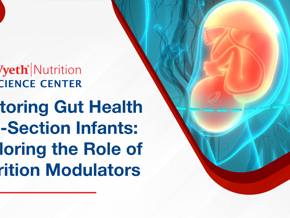
[Hot Science] Randomized clinical trial on bovine milk oligosaccharides (BMOs) supplementation, intestinal biomarkers and microbiota
Method
Part I. Healthy full-term infants were enrolled at birth and randomized within the first 48 hours to receive one of the following interventions,
- Control group (n = 40) – standard formula
- FLP group (n = 44) – standard formula + bovine lactoferrin at 1 g/L + Bifidobacterium animalis ssp lactis CNCM I-3446 (B. lactis) at 3.7 x 104 CFU/g powder formula
- FLPP group (n = 43) – FLP formula (same levels of lactoferrin and B. lactis) + bovine milk oligosaccharides (BMOs) at 6 g/L
- BF group (n = 75) – breastfed infants as reference
Part II. Washout period
- All test formula groups received a low protein starter formula with 67 kcal/100 mL energy, 1.8 g/100 kcal protein and 5.3 g/100 kcal fat
- BF group remained breastfed
Part III. Data collection at weeks 1, 2, 4, and 8, including one or more of the below parameters:
- Growth, digestive tolerance, adverse events
- Gut barrier function maturation
- Stool microbiota profile
Key Findings
Growth
- All groups had comparable anthropometric parameters at baseline
- No significant differences were observed between groups post-intervention
- All growth parameters followed the WHO standard curves
Adverse events,
- No differences in reported adverse events between groups
Digestive tolerance,
- FLPP group showed less hard and formed stools and more soft stools as compared to control and FLP groups during intervention period
- There were no significant differences between the different feeding groups for spitting-up and vomiting frequencies, infant’s crying time and colic frequency
Gut barrier function maturation,
- Compared to BF group, infants fed BMOs (i.e. FLPP group) had lower calprotectin levels along the intervention peiod
- Infants fed BMOs (i.e. FLPP group) also had elastase and α-1Antitrypsin (AAT) levels closer to breastfed infants during the intervention period, while concentrations were higher in the F and FLP groups when compared to BF group
- No differences for neopterin between groups along the intervention period
Stool microbiota profiles,
- Infants fed BMOs (i.e. FLPP group) showed microbiota profile overlap with breastfed group at week 1 and 4, both dominated by Bifidobacterium (at 77% for FLPP group and at 81% for breastfed infants)
Conclusion
- Correlation was observed between microbiota profile changes and gut maturation marker calprotectin
- The supplementation of BMOs seems to favor gut maturation closer to that of breastfed infants
Link to publication: https://www.ncbi.nlm.nih.gov/pmc/articles/pmid/32443684/
Reference
Castanet M et al. Early effect of supplemented infant formulae on intestinal biomarkers and microbiota: a randomized clinical trial. Nutrients. 2020;12:1481.
Other articles that you might be interested in:
Metabolic effects of BMOs on selected commensals
WYE-EM-159-JUN-20
If you liked this post you may also like



